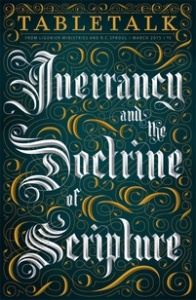Tackling Shame by W. Duncan Rankin | Reformed Theology Articles at Ligonier.org.
 The fourth and final featured article in the April issue of Tabletalk is penned by Dr. W.Duncan Rankin, a PCA pastor and associate professor of theology at Reformed Theological Seminary and at Reformation Bible College.
The fourth and final featured article in the April issue of Tabletalk is penned by Dr. W.Duncan Rankin, a PCA pastor and associate professor of theology at Reformed Theological Seminary and at Reformation Bible College.
His article is titled “Tackling Shame”, and in it Rankin sets out to give us the Christian (biblical) answer to the reality of shame. Tracing the broad lines of this consequence of sin (“The Problem of Shame” and “The Secret to Shame”), Rankin shows us again that any hope for deliverance from this “binding and demoralizing” reality is not to be found in man but only in Christ:
So, how do we unravel our shame? Hope in self only maddens, as learned through our repeated failures and frustration. The secret to shame must lie outside of ourselves, in the only hope we have ever had—Jesus Christ our Lord. Through His cross, Jesus relieves our guilt, as well as its cousin, shame.
And so the author shows us how Jesus by His perfect work of suffering and dying for His people answers to our need for shame-deliverance:
Identifying with us in our shameful condition, Jesus represented and substituted for His own people. In His lifelong active obedience, He earned the perfect righteousness that grounds their peace and can transform their shame (2 Cor. 5:21). In His passive obedience, He took the highest and most monstrous form of our human shame personally to Himself; as the eternal Son of God, He embraced disgrace stretching from the depths of earth to the heights of heaven as no one else could do. On Calvary alone can the cruelty of human shame be rightly felt and measured. There our bounty is great (Rom. 6:23).
Our shame begins to unravel as we see His dear person and know His matchless work to be our own. United to Him by faith through the Holy Spirit, our whole position changes (Eph. 2:4–9). Redeemed and reconciled to our heavenly Father by the Son of His love, the basis of our true shame is dealt with and our alienation removed.
With this in view Rankin ends with these thoughts – good ones for all of us burdened with our own shameful sins – past and present:
Believers tackle shame in this way as they live the rest of their Christian lives by His grace and strength. This means that we need the means of grace that He has appointed—the Word read, preached, sung, prayed, and seen in the sacraments. We also need those secondary means of fellowship (Acts 4:32) and church discipline (Gal. 6:1). Using all these practical answers to our shame, we can sit up, crawl, walk, and run to God’s glory, unraveling and despising the shame that so easily entangles us.






